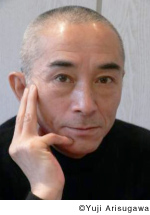Ushio Amagatsu | Sankai Juku leader, choreographer, director, Butoh dancer
 Born in Kanagawa, Japan in 1949. He founded the Butoh Company Sankai Juku in 1975. After the company had presented the works “Amagatsu Sho” (1977), “Kinkan Shonen” (1978), and “Shoriba” (1979) they departed for their first world tour. In 1981 they moved their work base to France, drawing on a long-term cooperation with the Théâtre de la Ville in Paris. In that same year Sankai Juku was invited to the Avignon Festival with “Bakki”. Since then every two years a new work by Sankai Juku has been premièred at the Théâtre de la Ville. Apart from his work with Sankai Juku, Amagatsu collaborated with several artists from different genres. In 1988 he created “Fushi” on the invitation of Jacob's Pillow Foundation in the US, with music by Philip Glass. In 1989, he was appointed the artistic director of the Spiral Hall in Tokyo where he directed “Apocalypse” (1989), and “Fifth-V” (1990) for a team of American dancers. In 1992, he presided over the Jury of the International Meeting of Dance of Bagnolet, and in that same year was awarded the "Chevalier de l’Ordre de l'Art et des Lettres" by the French Cultural Ministry. He has also been directing a number of operas, such as “Bluebeard's Castle” by Bartók in 1997, conducted by Peter Eötvös at the Tokyo International Forum. In March 1998, at the Opéra National de Lyon, France, he directed Peter Eötvös' contemporary opera “Three Sisters” (world première), which received the "Prix du Syndicat National de la Critique, France." “Three Sisters” has been seen in the 2001-2002 season at Théâtre de Châtelet in Paris, at the Théâtre Royal de la Monnaie in Brussels, and at the Opéra National de Lyon, and at the Wiener Festwochen 2002 in Austria. In 2008, after ten years, he collaborated with Eötvös again for his new opera composition, “Lady Sarashina” based on the diary of a Japanese lady’s maid in the 11th century (Sugawara no Takasue no Musume). This work was premièred at the Opéra National de Lyon and won the "Prix du Syndicat National de la Critique" again.
Born in Kanagawa, Japan in 1949. He founded the Butoh Company Sankai Juku in 1975. After the company had presented the works “Amagatsu Sho” (1977), “Kinkan Shonen” (1978), and “Shoriba” (1979) they departed for their first world tour. In 1981 they moved their work base to France, drawing on a long-term cooperation with the Théâtre de la Ville in Paris. In that same year Sankai Juku was invited to the Avignon Festival with “Bakki”. Since then every two years a new work by Sankai Juku has been premièred at the Théâtre de la Ville. Apart from his work with Sankai Juku, Amagatsu collaborated with several artists from different genres. In 1988 he created “Fushi” on the invitation of Jacob's Pillow Foundation in the US, with music by Philip Glass. In 1989, he was appointed the artistic director of the Spiral Hall in Tokyo where he directed “Apocalypse” (1989), and “Fifth-V” (1990) for a team of American dancers. In 1992, he presided over the Jury of the International Meeting of Dance of Bagnolet, and in that same year was awarded the "Chevalier de l’Ordre de l'Art et des Lettres" by the French Cultural Ministry. He has also been directing a number of operas, such as “Bluebeard's Castle” by Bartók in 1997, conducted by Peter Eötvös at the Tokyo International Forum. In March 1998, at the Opéra National de Lyon, France, he directed Peter Eötvös' contemporary opera “Three Sisters” (world première), which received the "Prix du Syndicat National de la Critique, France." “Three Sisters” has been seen in the 2001-2002 season at Théâtre de Châtelet in Paris, at the Théâtre Royal de la Monnaie in Brussels, and at the Opéra National de Lyon, and at the Wiener Festwochen 2002 in Austria. In 2008, after ten years, he collaborated with Eötvös again for his new opera composition, “Lady Sarashina” based on the diary of a Japanese lady’s maid in the 11th century (Sugawara no Takasue no Musume). This work was premièred at the Opéra National de Lyon and won the "Prix du Syndicat National de la Critique" again.




